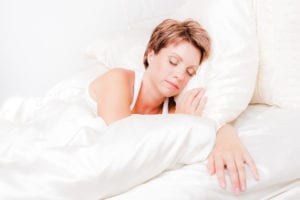Written by Shirley Kotadia, Staff Writer. Eight weeks of supplementation with either 500 mg of lavender or 500 mg of bitter orange twice daily significantly improved sleep quality in the one hundred and four participating postmenopausal women compared to the control.
 One of the most common complaints by women during menopause is poor sleep quality, including difficulty falling asleep, waking during the night, inability to resume sleep, fractioned sleep, and difficulty waking up1. Consequently, those with poorer sleep qualities experience problems in memory, decreased efficiency, reduced quality of life, increased healthcare costs, and symptoms of depression and anxiety2.
One of the most common complaints by women during menopause is poor sleep quality, including difficulty falling asleep, waking during the night, inability to resume sleep, fractioned sleep, and difficulty waking up1. Consequently, those with poorer sleep qualities experience problems in memory, decreased efficiency, reduced quality of life, increased healthcare costs, and symptoms of depression and anxiety2.
One of the current treatments is sleep medications, such as benzodiazepines. However, many women are unable to take them due to risk and/or choose to avoid them due to their potential serious side effects, which include prolonging sleep stages, drowsiness, dizziness, depression, and nausea3. Two possible alternatives are lavender (Lavandula Angustifolia) and bitter orange (Citrus Aurantium) herbal supplements. Both plants contain linalool, which has been found to have sedative and hypnotic effects4.
A recent Iranian triple-blind, randomized, controlled 8-week study sought to compare the effects of lavender and bitter orange oral supplements on sleep quality7. One hundred fifty-six postmenopausal women, between ages 45-60 years, whose last menstruation occurred 1-6 years ago and who were not using hypnotic drugs, alcohol, or tobacco, were randomly assigned into 1 of 3 groups: Placebo, Lavender, or Bitter orange. Participants were instructed to take one capsule, which contained either 500 mg starch, 500 mg lavender, or 500 mg bitter orange, twice daily (one after breakfast and one after dinner) for eight weeks. At the beginning and the end of the study, researchers collected data using a socio-demographic questionnaire and Pittsburgh Sleep Quality Inventory (PSQI).
One-way ANOVA indicated that there was a statistically significant improvement between the lavender and control group (95% CI: -1.82 to -0.30; p-value = 0.003) and between the bitter orange and control group (95% CI: -2.22 to -0.78; p-value < 0.001). There was no statistically significant difference between the lavender and bitter orange group (95% CI: -0.30 to 1.09; p-value = 0.264). There were no statistically significant differences based on the socio-demographic questionnaire. Side effects reported were mild and transient. Of the lavender group, only 8.2% reported nausea, 0% vomiting, 4.1% palpitations, and 4.1% headaches. In the bitter orange group, 4.2% reported nausea, 0% vomiting, 4.2% palpitations, and 2.1% headaches. Lastly, in the control group, 10.4% reported nausea, 0% vomiting, 2.1% palpitations, and 6.3% headaches.
Overall, the findings suggest that 500 mg of lavender or bitter orange twice daily for eight weeks will improve sleep quality in postmenopausal women. Oral linalool found in both lavender and bitter orange may inhibit the release of acetylcholine, thus change the ionic function at the neuromuscular junction. The sedative effect of linalool may also be explained by its interaction with gamma-aminobutyric acid receptors of the central nervous system. Researchers noted that because this is one of the very few studies evaluating oral lavender and bitter orange’s effect in postmenopausal women and that there is some inconsistency between this study and others that focused on the effects of aromatherapy, further studies should be conducted to determine the accuracy of the results.
Source: Kamalifard, Mahin, Azizeh Farshbaf Khalili, Mahsa Namadian, Sepideh Herizchi, and Yunes Ranjbar. “Comparison of the Effect of Lavender and Bitter Orange on Depression in Menopausal Women: A Triple-Blind Randomized Controlled Trial.” INTERNATIONAL JOURNAL OF WOMENS HEALTH AND REPRODUCTION SCIENCES 5, no. 3 (2017): 224-230.
© 2017 The Author (s); Creative Commons Attribution License (http://creativecommons.org/licenses/by/4.0)
Click here to read the full text study.
Posted January 15, 2018.
References:
- Xu H, Thurston RC, Matthews KA, et al. Are hot flashes associated with sleep disturbance during midlife? Results from the STRIDE cohort study. Maturitas. 2012;71(1):34-38.
- Abbasi B, Kimiagar M, Sadeghniiat K, Shirazi MM, Hedayati M, Rashidkhani B. The effect of magnesium supplementation on primary insomnia in elderly: A double-blind placebo-controlled clinical trial. Journal of research in medical sciences: the official journal of Isfahan University of Medical Sciences. 2012;17(12):1161.
- Sithamparanathan K, Sadera A, Leung L. Adverse effects of benzodiazepine use in elderly people: a meta-analysis. Asian J Gerontol Geriatr. 2012;7(2):107-111.
- Suryawanshi JAS. An overview of Citrus aurantium used in treatment of various diseases. African Journal of Plant Science. 2011;5(7):390-395.

